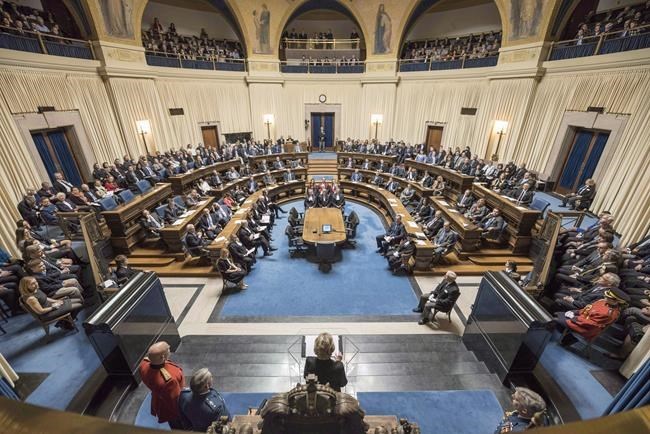WINNIPEG — Manitoba and Nova Scotia are joining two other jurisdictions in recognizing a new federal statutory holiday to contemplate the history and harmful legacy of residential schools.
Indigenous Reconciliation Minister Alan Lagimodiere announced Friday that Manitoba will observe the National Day for Truth and Reconciliation on Sept. 30.
"We all have a role to play in reconciliation," Lagimodiere said in a news release.Â
"We can all listen, learn and support the healing needed to address the intergenerational trauma caused by the residential school system."
Schools will be closed and no classes will be held on Sept. 30. Public servants will also observe the day and non-essential government services and offices will be closed. Flags on all provincial government buildings are to be lowered to half-mast.
The House of Commons unanimously supported legislation in June giving the statutory holiday to all federal employees and workers in federally regulated workplaces.Â
Cindy Woodhouse, the Assembly of First Nations regional chief for Manitoba, said there's no excuse for a province not to follow the federal government's move.
"We cannot have reconciliation without truth and we cannot have truth without accountability," she said in an interview.Â
Woodhouse encourages all Canadians to familiarize themselves with the Truth and Reconciliation Commission's 94 calls to action, which included creation of a national holiday.Â
Nova Scotia also said Friday that it will recognize the day. Provincial government offices, public schools and regulated child care will be closed, although businesses will have the choice to remain open.
British Columbia and the Northwest Territories have already indicated they will observe the day.
B.C. said last month that it had advised provincial public-sector employers to mark the day and recognize obligations in a vast majority of collective agreements.Â
The province said many public services will remain open, but may be operating at reduced levels. Most schools, post-secondary institutions, some health-sector workplaces and Crown corporations are to be closed.
In the N.W.T., the day is to be observed annually by territorial government employees, including public servants and teachers.Â
Most other provinces and territories told The Canadian Press they have no plans to make the day a statutory holiday, instead encouraging employees to reflect and commemorate in their own way.
Alberta told CTV Edmonton it won't legislate the holiday, but that provincial government flags will be lowered.
Gladys Wasylenchuk with Saskatchewan's Ministry of Labour Relations said in an email that changes would have to be made to the province's employment act to make Sept. 30 a public holiday for workers in provincial workplaces. She said there are no plans to make those changes at this time.Â
Saskatoon Tribal Council Chief Mark Arcand said he had hoped Saskatchewan would recognize the day as part of reconciliation, "because this is a moment in history that affected a lot of Indigenous people."Â
Arcand said despite the province's decision, he would like to see non-Indigenous people take their own steps to learn about the history, but also about the healing taking place in Indigenous communities.Â
Quebec Premier Francois Legault said in June there were no plans to add a statutory holiday. That position hasn't changed, said Mathieu Durocher, spokesman for Indigenous Affairs Minister Ian Lafreniere.
In the Atlantic, New Brunswick, Prince Edward Island, and Newfoundland and Labrador all told The Canadian Press they would not be observing the day at a provincial level.Â
Yukon said in a news release that it will be working with First Nations, businesses and communities over the next few months on how to best mark the day with respect and compassion.Â
Nunavut said to date no legislation has been passed to observe the holiday.Â
Ontario has not decided how it will mark the day.Â
The government said it is working with Indigenous partners, residential school survivors and affected families to ensure, "the respectful commemoration of this day within Ontario," said Curtis Lindsay, press secretary for Indigenous Affairs Minister Greg Rickford
This report by The Canadian Press was first published Sept. 3, 2021.
— With files from Sidhartha Banerjee in Montreal, Holly McKenzie-Sutter in Toronto and Emma Tranter in Iqaluit
___
This story was produced with the financial assistance of the Facebook and Canadian Press News Fellowship.
Brittany Hobson, The Canadian Press

